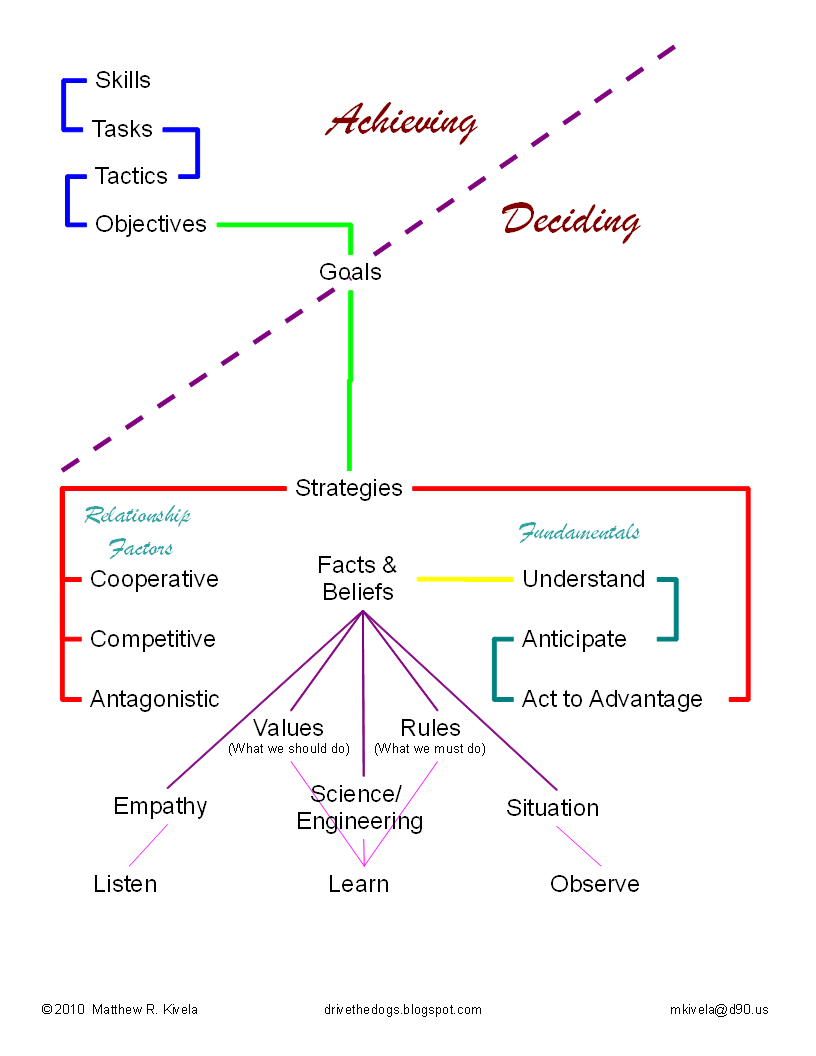When developing strategy, it is important to consider relationships.
Is the strategy involving parties who are cooperative, competitive, or antagonistic?
Antagonistic relationships are defined by active opposition.
Competitive relationships involve parties trying to be more successful then the others in acquiring resources and recognition.
Cooperative ones are mutual beneficial.
Parties may simultaneously fit different aspects of their relationship into more then one category.
Making decisions become a real challenge when your decisions impact different parties, some of whom may be cooperative, some competitors, some enemies, and some who blend all of those.
Problems arise when you don't recognize the proper relationship. Or worse, when you create the wrong relationship!
Mismatches
When parties see their relationships differently, and they don't realize it, it can cause bad decisions to be made. If one party believes the relationship is cooperative on both sides, but the other party views the situation as competitive, the first party will probably be at a disadvantage.
Another bad situation is when a third party fails to recognize the true dynamic. A common situation within a corporation for a boss to assume everyone under him is cooperating, when in reality two managers may be competitive (or sometimes antagonistic). If the boss doesn't realize this, much time and effort can be wasted to produce only frustrated employees.
Altering the Relationship
Some of the greatest successes come when one recognizes the opportunity to change the relationship for the better -- to be able to take an antagonistic relationship to a competitive or even cooperative one can often result in less stress and better allocation of resources.
Diplomacy is probably where the most complicated matrix of mixed relationships form.

To Gorbachev, Reagan seemed the embodiment of glasnost itself; open to ideas, willing to face reality, relaxed with himself. "I remembered the episode when we were sitting down together," Gorbachev recalled years later. "The President said I think the time has come for us to be on a first-name basis. Call me Ron." (1)
The traits of being open, realistic, relaxed that Gorbachev saw in Reagan in Geneva during their meeting of November, 1985 are valuable traits to have.
Relationships can be complicated. A year and a half later, in June 1987 Reagan was riding in a limo on his way to a speech when he mused, "The boys at State are going to kill me."(2) The approach used to negotiate towards arms control (a cooperative win-win) is not the same to use when directly challenging the communist world's economic and political system -- at that point still (and possibly once again in the future) a fundamentally antagonistic clash of cultures.
In the 1950's, Khrushchev predicted: "We will bury you." But in the West today, we see a free world that has achieved a level of prosperity and well-being unprecedented in all human history. In the Communist world, we see failure, technological backwardness, declining standards of health, even want of the most basic kind- too little food. Even today, the Soviet Union still cannot feed itself. After these four decades, then, there stands before the entire world one great and inescapable conclusion: Freedom leads to prosperity. Freedom replaces the ancient hatreds among the nations with comity and peace. Freedom is the victor.
And now the Soviets themselves may, in a limited way, be coming to understand the importance of freedom. We hear much from Moscow about a new policy of reform and openness. Some political prisoners have been released. Certain foreign news broadcasts are no longer being jammed. Some economic enterprises have been permitted to operate with greater freedom from state control. Are these the beginnings of profound changes in the Soviet state? Or are they token gestures, intended to raise false hopes in the West, or to strengthen the Soviet system without changing it? We welcome change and openness; for we believe that freedom and security go together, that the advance of human liberty can only strengthen the cause of world peace.
There is one sign the Soviets can make that would be unmistakable, that would advance dramatically the cause of freedom and peace. General Secretary Gorbachev, if you seek peace, if you seek prosperity for the Soviet Union and Eastern Europe, if you seek liberalization: Come here to this gate! Mr. Gorbachev, open this gate! Mr. Gorbachev, tear down this wall! (3)
Reagan, and Gorbachev, comprehended how their relationships on different issues, on different stages, playing to themselves and to other audiences foreign and domestic, would not always fit a neat category. It wasn't easy, and it wasn't overnight; nor did calling each other by first names suddenly end all the tensions and failed negotiations; but they still played an elaborate game that in the end we came out of the 1980s far safer and better then we entered them.
==========
Footnotes
(1) "Ronald Reagan" by John Patrick Diggins, p. 359; Diggins footnotes this as two sources: "President Reagan," Cannon p. 673; "Once Red, "Mr. Green" [Gorbachev] Is a hero anywhere but home," New York Times, 23 Oct 2004
(2) http://www.historynet.com/president-ronald-reagan-inside-story-of-reagans-berlin-challenge-to-tear-down-this-wall.htm
(3) Full text is available here.

No comments:
Post a Comment